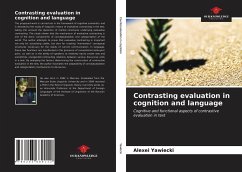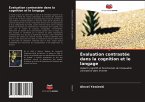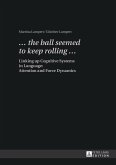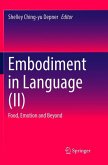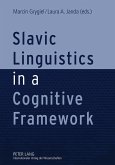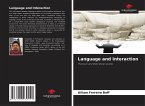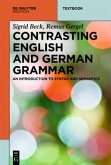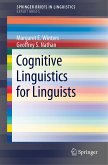The proposed work is carried out in the framework of cognitive semantics and is devoted to the study of linguistic means of evaluative contrasting in the text, taking into account the dynamics of mental structures underlying evaluative contrasting. The study shows that the mechanism of evaluative contrasting is one of the basic components of conceptualization and categorization of the world. The author attempts to prove that evaluative contrasting is important not only for actualizing stable, but also for creating "momentary" conceptual structures necessary for the needs of current communication. In language, these two functions are manifested in the presence of conventional antonymic pairs, as well as in the ability of speakers to relatively easily create new and sometimes unexpected contrasting relations between various discursive units in a text. By analyzing the factors determining the construction of contrastive evaluation in the text, the author illustrates the adaptabilityof conceptualization and categorization mechanisms to discourse.
The proposed work is carried out in the framework of cognitive semantics and is devoted to the study of linguistic means of evaluative contrasting in the text, taking into account the dynamics of mental structures underlying evaluative contrasting. The study shows that the mechanism of evaluative contrasting is one of the basic components of conceptualization and categorization of the world. The author attempts to prove that evaluative contrasting is important not only for actualizing stable, but also for creating "momentary" conceptual structures necessary for the needs of current communication. In language, these two functions are manifested in the presence of conventional antonymic pairs, as well as in the ability of speakers to relatively easily create new and sometimes unexpected contrasting relations between various discursive units in a text. By analyzing the factors determining the construction of contrastive evaluation in the text, the author illustrates the adaptability of conceptualization and categorization mechanisms to discourse.
The proposed work is carried out in the framework of cognitive semantics and is devoted to the study of linguistic means of evaluative contrasting in the text, taking into account the dynamics of mental structures underlying evaluative contrasting. The study shows that the mechanism of evaluative contrasting is one of the basic components of conceptualization and categorization of the world. The author attempts to prove that evaluative contrasting is important not only for actualizing stable, but also for creating "momentary" conceptual structures necessary for the needs of current communication. In language, these two functions are manifested in the presence of conventional antonymic pairs, as well as in the ability of speakers to relatively easily create new and sometimes unexpected contrasting relations between various discursive units in a text. By analyzing the factors determining the construction of contrastive evaluation in the text, the author illustrates the adaptability of conceptualization and categorization mechanisms to discourse.

